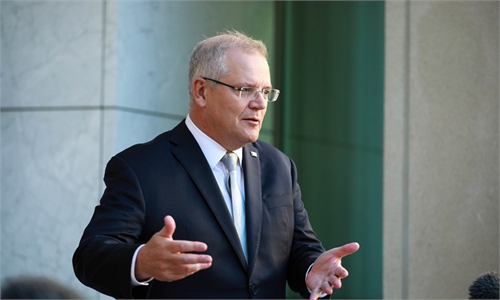Calls rise for Australia to rethink hostile approach to China as losses mount
Hostile actions lead to great economic loss: businesses

Photo taken on May 28, 2021 shows an empty street in Melbourne, Australia. Photo:Xinhua
Calls for the Australian government to pursue in-depth communication with China based on mutual understanding are rising among business communities and local officials in Australia, as Canberra's hostile approach to bilateral ties with China continues to inflict pain on local businesses.
The calls came as some in Australia continue to advocate decoupling from China as the two countries continue to spar over trade disputes at the WTO. Tension between the two countries has and will continue to seriously hurt the Australian economy, businesses warned.
Australia's move to tear up the Belt and Road Initiative (BRI) pact with Victoria State in April has blocked direct foreign investment in the state, which would definitely affect employment and infrastructure development in Victoria, Alex Lim, president of the Chinese Chamber of Commerce of Victoria (CCCV), told the Global Times in an interview on Monday.
Lim said that the COVID-19 pandemic has already left the economy in Victoria in a state of limbo for a long time, and a perceived decline in direct foreign investment as a result of the move would greatly affect the economy of Victoria and even Australia.
The Chinese community in Australia believes that more efforts should be done for the two countries to discuss the bilateral issues, with more patience and understanding being put into the discussion and practice, Lim said.
Australian exporters are also seeking to retain positive relationships with China, as China remains a critical trade partner for Australian businesses in several key sectors.
A spokesperson from Woodside Energy, one of Australia's biggest liquefied natural gas (LNG) exporters, said that Woodside is maintaining strong business-to-business relationships with its Chinese customers, who are continuing to buy Australian LNG.
In a statement sent to the Global Times on Thursday, the company said that it has very productive ongoing relationships in China.
"We see China as a key strategic partner for the development of Australia's - and Woodside's - resources and firmly believe such partnerships deliver value for all. Woodside expects its strong relationships with Chinese counterparties to remain important into the future," read Woodside's statement.
Together with iron ore, LNG is the most valuable commodity export of Australia. Relatively stable trade of the two commodities has helped ensure Australia's exports to China stay at a high level despite growing trade disputes that engulf a long list of goods.
Calls for the Australian federal government to reflect on its China strategy also came from local officials.
Western Australian Premier Mark McGowan has urged the federal government to stop antagonizing China, as China remains Australia's top trade partner, Reuters reported on June 15.
The growing calls came as losses for Australian businesses continue to mount.
A strained China-Australian diplomatic relationship has gravely affected Australian exports to China, especially wine and seafood, said Lim, adding that the group's members who own wine export businesses have experienced losses close to 50 percent, and losses for seafood exporters have reached 50-90 percent.
Members with hospitality businesses including hotels, student accommodation, rentals, restaurants and other services supporting the student community have had to close or scale down the size of their operations, said Lim, noting that rentals in Melbourne have fallen 20-30 percent.
The education sector has been significantly affected, with the number of students from China being reduced, which has affected businesses not only linked to the Chinese community but also across the economy.
Lim said that Australian universities have had to roll back spending and cap the number of employees due to the decrease in student enrollment, which is reducing tuition income, as the number of Chinese students dropped significantly amid tense bilateral relations.
Australia has repeatedly taken discriminatory measures against Chinese companies, politicized trade and investment, and heightened cross-border investment reviews based on so-called national security concerns.
China has harshly criticized the Australian government's unreasonable provocations against China and stressed that Canberra must rectify its mistakes to improve bilateral ties.
Chinese Foreign Ministry spokesman Zhao Lijian said on Wednesday that the Australian side bears full responsibility for successive setbacks in China-Australia relations over the past several years.



